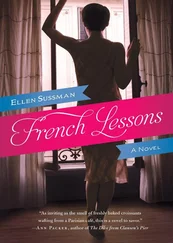“Wait. You’re not responsible for anything,” he said. “Don’t get that guilty wrinkle in your forehead.”
Was he already familiar with my facial expressions? Of course I was guilty. This conversation was wrong. But I was also elated. These were two feelings that should not exist in the same picture, a travesty. I was out of my depth.
He pressed on. “All I meant was, you opened my eyes that day we walked around together. You’re making your own way as your own someone and I’m impressed by that. You’re also very, very pretty. You have eyelashes like tarantula legs. And I’d love to spend a little more time with you before I disappear into the mines.”
The only release I could find was laughter, which he took as encouragement because he made me promise to meet him in the Marais the following evening at seven. There was a tiny horseshoe-shaped bar he liked, called Le Petit Fer à Cheval.
I said I would be there. I refrained from asking why we couldn’t meet tonight. Now that I was on this insane path, I wanted heedlessly to find out where it led. I was scared, and preferred to know the worst rather than be in the dark.
After lunch, he kissed me briefly on the lips.
We walked our separate ways down the rue du Cherche-Midi. I had to get back to my time lines for Lydia. He did not say where he was headed. I turned to look at him a couple of times, his back maneuvering through autumn’s trench-coated crowd, shouldering the duffel into which he had packed the clean shirts and the gifts from Portia, which now seemed pathetic rather than intimidating, her desperate stab at buying his waning affections.
Much to Clarence’s irritation, I had virtually emptied the “petty cash” drawer to pay for these presents. “Portia asked you to do what?! Poor thing …”
Moments after I slipped back into the apartment, the phone rang. Clarence handed me the receiver in the kitchen. “A young man for you,” he said.
I was confused. The only young man I knew who had this number was Olivier, and Clarence would surely have recognized Olivier’s voice. I supposed my mother would have given the number to my ex, Peter, if he’d asked, but I couldn’t think what reason he would find to call me long-distance. He had never shown any urgency toward me. Why now? The mere thought of his indifference made me sure that no boy would ever telephone. There must be some mistake.
It was my cousin Étienne. He seemed to feel none of my trepidation about our cruel past. There was a familiarity in his voice that suggested memories on his part that had nothing to do with mine. He sounded as though we had always bantered playfully and were simply taking up where we had left off. He was, it turned out, a very good actor.
“ Alors, c’est chic ta nouvelle adresse. ”
“Assez chic, oui.” My new address was chic enough.
Who was this lady I was working for in such a posh part of town? Was she rich? Did she buy lots of jewelry? Because Étienne was about to start a jewelry line, part precious, part objets trouvés.
Very postmodern, I said.
Did he actually want to engage with me? Why was I so afraid? I was no longer the little girl he could tease in a Paris that belonged to him.
He sang the word “postmodern” back to me several times before he declared that he would call his jewelry line “PoMo” and thanked me for the inspiration although he wasn’t exactly sure what the term meant (I did not believe him) because he hadn’t gone to college (probably true). He hadn’t even gotten his high school baccalaureate. Had I heard? His parents were devastated. They had always seen him as a fonctionnaire, somewhere deep in the postal system or maybe a prof de gym . They hoped he would follow them back to his roots in Orléans, build his own little house down the street from theirs. Here he made himself laugh very loud, and I could see his eleven-year-old neck arched way back, his tongue halfway out and shining.
At ten in the morning, he sounded like he was on speed. I understood why Solange and Jacques were worried.
“I’m just home from a big night,” he said. “Hey, we should go clubbing together sometime.”
“With pleasure.”
So, he was going to court me now. How odd.
“Yes,” he said, “you’ve always been eager to please.”
Was it that simple? I winced.
This was the slender and harsh boy with the pitch-dark lashes who had made it clear that he did not want to know me in the schoolyard, me, the milk-fed American cousin who did not know the élastique routines of the other girls and had visible knots in her hair and who studied so hard that his parents never stopped asking why he couldn’t be more like me. They pointed to the big books I read and my promising drawings. He was forced to be polite to me because I was a pauvre fille, a poor girl who was losing her father. Didn’t he know how lucky he was, they whispered, not to be abandoned? Mais elle me barbe , he said. She bores me.
Did he remember that I had gotten lice and he had called me dégueulasse ? Did he recall that I would do anything for a chocolate éclair, even slip him the answers to a math test or hold hands for ten seconds with the dirty old man on the bench outside the hardware store while his friends watched? Did he know now that it wasn’t for the éclair but for love of him that I had been willing to prove so brave? I had simply been more mortified by my love than by the base act of accepting a pastry for my favors. Shame is good cover.
Now, though, over this phone eleven years later, he wanted to know me .
What was I doing this weekend?
He was having un petit dîner chez lui on Friday night. Would I come?
Two nights from now. I took a deep breath and asked what I could bring.
He said he loved champagne and that it would be great to see me after all this time. He hoped I was still cute. He gave me an address. The closest Métro was Bastille. And by the way, did the woman I worked for shoot publicités ?
Absolutely not, I said. She’s not that kind of photographer. Then I told him I loved champagne too, although I’d only had the real kind once or twice. Maybe we would discover some affinities after all.
Once I had seen him, I would call his parents and make a plan to visit them in Orléans.
That evening, Clarence sent Claudia and me to a Pasolini movie about Christ’s life, scored with Bach’s St. Matthew Passion. He said it was heartbreakingly beautiful. He wanted to know how we would react.
As the movie played, black and white, lyrical, unstudied, cast with ordinary Italians playing peasants who were at once beatific and disillusioned, I recounted it to Olivier in my head. I saw his eyes react, his chin cocked in its listening pose. I had never been so focused—or so distracted.
Several times, the heat of Claudia’s gaze lit my face, and I swiveled to see her expression like that of the people on the screen watching Jesus suffer. Their eyes deepened to the swell of the gorgeous choruses, so that they looked both infinitely wise and clueless. Claudia’s pupils burned me with the same idiot understanding, blessed somehow, but also brutally judgmental.
I squirmed. Yet I was touched by her attention. I knew she could sense an obsession under my skin. I wanted to describe it to her, to tell her about Olivier, to begin to forge a real bond. And even though I couldn’t talk to her, her growing friendship was a comfort.
“What did you think of the film?” Claudia asked at a traffic light on the way home.
“Clarence was right. It was beautiful. The music and the faces were so full.”
Читать дальше












